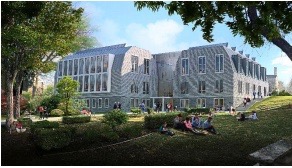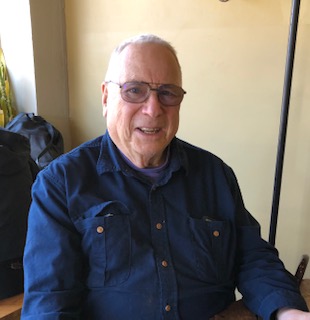Opinion: Why I Will Vote No On The Library Referendum

Architects rendering of the proposed renovated Jones Library. Finegold Alexander Architects. Photo: Jones Library

I will vote “NO” on November 2 on the library referendum. It would be easy for me to explain what I am against and why I am against it. But I want to explain what I am for, and why a NO vote is, at the moment, the only means of achieving what I am for. I believe that there are a great many people in town who share my hopes for the future of Amherst, and of Amherst’s libraries, and I want to persuade them that a NO vote is a path to the future we want.
- I want to protect what’s left of the human scale downtown. This is urgently important to me, although I didn’t realize it until the big buildings came to downtown. The streetscapes, landscapes and skyscapes are important not only to our town’s beauty but also to the mental health of its residents and visitors. The proposed library expansion plops a large, ungainly building on grounds that used to be greensward and garden. I use that inelegant verb advisedly because that is what it will look like. From the south the new addition will fit jarringly with the original facade, which is being retained. From the west, the expanded library will creep closer to and overwhelm the small and fragile Strong House. From the north the hugeness of the new building will be most apparent, out of scale and out of keeping with the wooden Strong House and the brick Amherst Works. I hope that before November 2, voters will spend a few moments on Amity Street and notice how important both the lawns and gardens, as well as the scale of the buildings, are to the character of our downtown, especially now that downtown is being urbanized. In contrast, look at the ingenious way that the Amherst Cinema Building was developed by Barry Roberts. That development honors human scale and the textures and materials of Amherst’s history. I want similar sensitivity in the renovation and expansion of the Jones Library building, but the only way to get it is to vote NO on November 2.
- I want more collaboration among the various departments of Amherst’s government. Long ago, they recognized the value of collaborating when developing the capital improvements area of the town budget. But that collaboration rarely extended to planning and developing the human environment we all share. The Trustees have their plans for a new library, the school committee has its plans for a new school, and the town has its plans for a new firehouse and public works depot. The independence of the library trustees and the school committee is important but does not rule out collaboration and at this moment requires it. Imagine a Jones Library devoted to research, collaboration with the Amherst Historical Society, and adult programming. Imagine a Jones Library that moves its circulating collections and its family programming to a Wildwood building that it shares with the Amherst Senior Center. What funds would be required to renovate the Wildwood School to allow this future shared use? If ideas like this are of any interest, a NO vote is necessary before they can be considered, debated, and improved.
- I want to support a renovation and enlargement plan that is more thoughtful about the future of the library than the plan we are being offered by the Trustees. What is this Teen Center that seems to loom large in the plans? Is it a place for teens to study and use library resources? If so why do they need to be segregated? Or is it a place for teens to meet, relax and play games? If so, why should it be in the library? A Teen Center might well be an important part of the town’s planning. Who is considering what purposes it serves? Who is involving teens in its planning and oversight? Similarly, adult education, including ESL, seems to be something the library wants additional space for. Now that the town has taken “Supplemental Education” out of the remit of the former LSSE, maybe it is appropriate for the library to take it on. But others are also offering adult education. Is the library talking to the newly named Department of Recreation? The Senior Center? Amherst Neighbors, which has an expanding commitment to programming for seniors? Churches and community groups which have been providing services for adults and families forever? Who knows what spaces are available in town for public use? To my knowledge there has never been an inventory which might help us understand whether the spaces the library is designing are in fact necessary. Until the library and the Town demonstrate that they are committed to the synergy that can emerge from collaboration I will vote NO on the referendum.
- This is the first of the major capital projects to seek funding from the taxpayers. Since these projects were announced, the Town has been undergoing some tough thinking, tough listening and tough learning about itself as an uncomfortable home for many of its residents. As part of its publicity and fund-raising the Trustees assert that the library enlargement addresses “social justice” needs in the town. Let me be blunt about this: part of my own ongoing tough learning is that social justice is not something people in power “give” to those who lack power. It is not something that the well-off “give” to the needy. It is not something that white people “give” to people of color. The library seems pretty remote from these discussions in town. I am ready to stand corrected if I am mistaken about this. But as it stands right now, the library project is not connected to social justice. Being committed to social justice is being committed to sharing power, to conversation (not just listening) with those not well represented in Amherst’s power structure, and to a certain amount of humility, which doesn’t come easily to an academic community. I am glad that the library is planning to enlarge and diversify its collections and services but let’s not devalue the essential nature of social justice by reducing it to resources and services being offered to the less powerful by the more powerful. As the first capital project to be presented to the public for funding, the library enlargement is the first to be able to take advantage of the tough learning the town has recently been undergoing. But it can only do this by starting over, by publicly inviting the communities of Amherst residents to participate in planning for the future. A library committed to social justice would be a model for other capital projects, but it can only be so by voting NO on November 2.
Michael Greenebaum was Principal of Mark’s Meadow School from 1970 to 1991, and from 1974 taught Organization Studies in the Higher Education Center at the UMass School of Education. He served in Town Meeting from 1992, was on the first Charter Commission in 1993, and served on several town committees including the Town Commercial Relations Committee and the Long Range Planning Committee.

I would respectfully disagree with Michael Greenebaum on all the points he made above, and urge every Amherst voter to vote “YES” on the Jones Library Project. We have an opportunity to make the Jones so much better, for so many people, in so many different ways. This is especially true for children and teens, who will thrive in the new spaces being designed specifically around their needs. I fervently believe that there is no single project in our community that will have so broad an impact. The library should be readily accessible, welcoming and open to all – and part of that means providing a physical space that can enable our terrific library staff to make everyone in the community feel comfortable and a have a sense of ownership in what could be described as Amherst’s “Peoples College”. The Trustees’ plan will accomplish this, and accomplish this well.
Yesterday’s Gazette has a piece by Michelle Miller, that, I think provides a terrific rebuttal to Michael’s objections. The link is here, I hope:
https://www.gazettenet.com/Guest-columnist-Michelle-Miller-42736207?fbclid=IwAR36Li4X0lu2_8nXe3fvNvqNKypG6RgieWjOzjlHQH7oynLbDESCcydiDBc
Sincerely,
Matt Blumenfeld
Perhaps surprisingly, I agree with most of Matt’s vision for the Jones Library (except perhaps for a room “designed specifically around [teens’] needs. Is that teens saying “We need,” or the library saying “You need”?)
What is curious is that while Matt says he disagrees with all my points, he offers no explanation or challenge to any of them. Nor does Michelle Miller’s interesting and valuable piece in the Gazette challenge any of the points I made in my commentary.
I invite Matt to explain his opposition to my commentary. Even more, I invite Matt and Austin Sarat and Sharon Sharry or other supporters of the Trustees’ plan to have a respectful conversation about competing visions for the future of the library. It ought to be possible; we all know each other. And the voters would profit immensely.